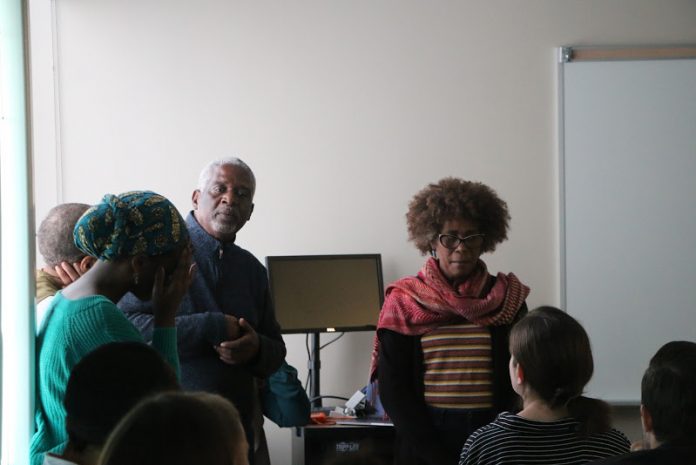
Two photographers presented to students their project about ongoing forced labor in the prison system, at the last lecture of the fall 2019 James Weldon Johnson Lecture Series on Nov. 21.
The lecture, held at at Trevor Colbourn Hall, was co-sponsored by the Florida Prison Education Project, a UCF initiative that provides prisoners with a higher education.
Keith Calhoun and Chandra McCormick, husband-and-wife photographers native to New Orleans, who’s project: “Slavery, The Prison Industrial Complex,” records the exploitation of prisoners in a maximum-security facility while also presenting their humanity and their perspective.
The project reminds people that prisoners are also human and deserve the same treatment as other humans. It also reminded students that there are people who are wrongly convicted.
“Thanks to this project, we’ve given people a voice now,” Calhoun said.
Calhoun mentioned he was grateful to be given the honor to share the side of the prisoners to the students.
Fon Gordon, associate professor of history and coordinator of Africana Studies at UCF, and Keri Watson, director of the Florida Prison Education Project joined Calhoun and McCormick to raise awareness about the prison industrial complex and inform the community about mass incarceration.
“Prison is supposed to be about rehabilitation,” Gordon said. “At what point can a person be reunited with the community and his family?”
The project’s exhibition documented the lives of prisoners in the Louisiana State Penitentiary, popularly known as Angola. It is an 18,000-acre prison farm that has a legacy of using penal labor as a method of punishment, treating prisoners like slaves.
Calhoun and McCormick said began documenting Angola in the 1980s. Their work has driven them to be a voice for the prisoners, advocating for their better treatment.
Their photography showcases the reality of penal labor, that continues to exploit prisoners today. They said their goal was to share their work with students to portray discrimination in the criminal justice system.
“The basis was to talk about Angola, prisons, and incarceration,” McCormick said. “I think that opportunities, such as this one, give us a platform to make more people aware of some of the things that are happening.”
According to the Constitution, the 13th Amendment abolished slavery nationwide, but it excluded penal labor. Therefore, forced labor is still a method of punishment used in prison systems in the U.S.
With the co-sponsorship by FPEP, Watson’s goal is to provide education to imprisoned students and reform the criminal justice system. FPEP’s mission is to address the injustice of mass incarceration and mistreatment of prisoners. This lecture supports spreading awareness on racial discrimination and penal labor.
Watson views the controversial issue as something that promotes brutality and is heavily influenced by white supremacy. Her objective is to bring that awareness to students for the sake of prison reform.
“When one in three black men are in prison, that’s a whole generation of potential and intellect,” Watson said. “You’re never going to be able to rebuild society in life as long as we have discriminatory policies in place that keep people locked in.”
During the event, the duo showcased different photos of their work on Angola.
One photo titled “Slavery” portraied black men walking in a line on a field while being supervised by an armed guard with a shotgun on horseback. Another, titled “Solitary,” showed prisoners locked behind bars in a dormitory. The photos are in black and white to highlight the humanity of the prisoners and the injustice of the prison system, the pair said.
The team of four said they are hopeful students will address the issue further. They said they believe if enough people are aware, they can change this for the sake of the incarcerated.
“Every prisoner has a story,” Gordon said. “That story, as well as that person, deserves hearing and understanding.”



